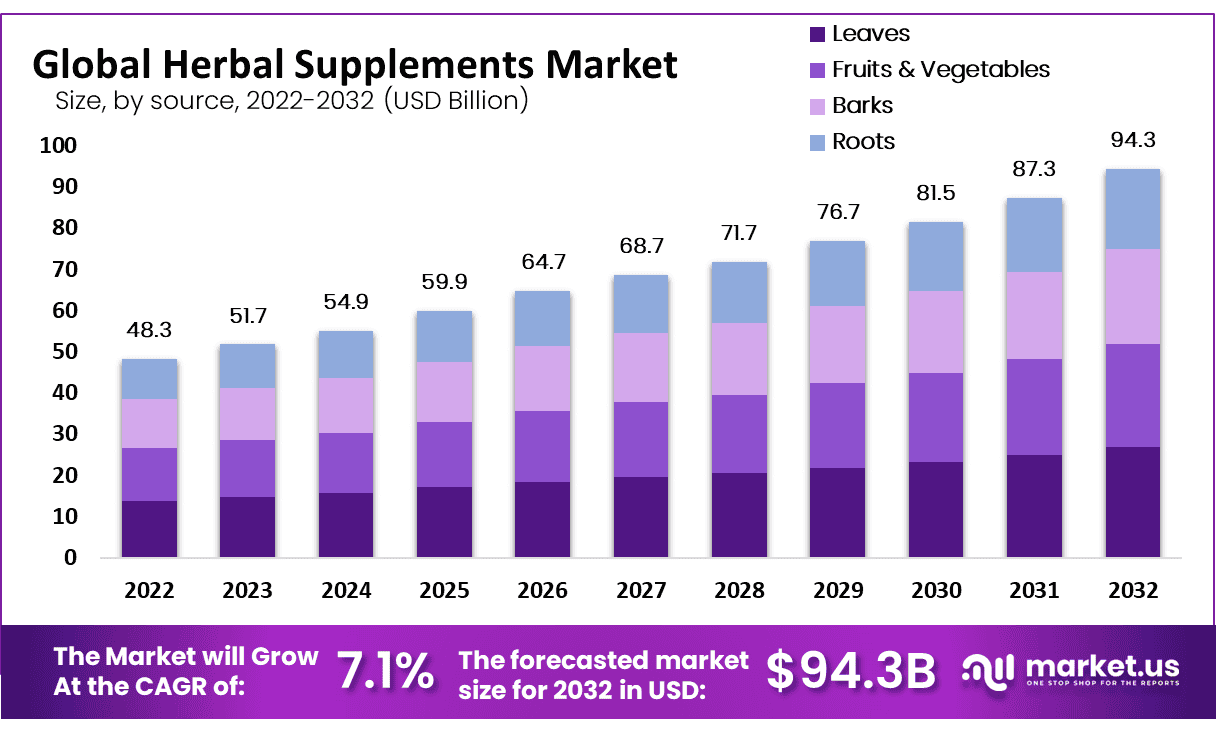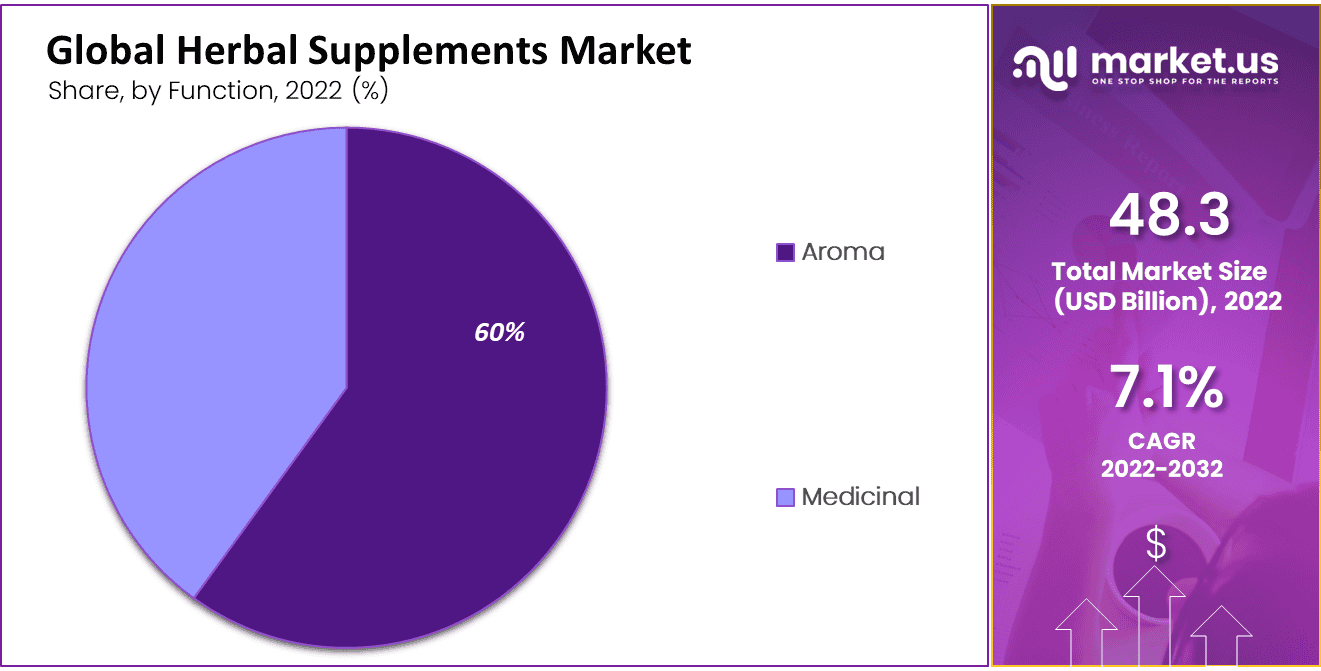Table of Contents
- Introduction
- Editor’s Choice
- Herbal Supplements Market Overview
- Top Herbal Supplements Exporting Nations
- Top Herbal Supplements Importing Nations
- Popular Herbal Brands for The Treatment of Chronic & Acute Disease
- Source of Information About Herbal Medicine
- Regulatory Guidelines for Herbal Supplements in Different Nations
Introduction
According to Herbal Supplements Statistics, Herbal supplements, derived from plants and utilized for centuries in traditional medicine systems, offer various health benefits supported by their natural compounds.
Available in diverse forms like capsules, extracts, and teas, these supplements contain phytochemicals such as flavonoids and alkaloids that contribute to their medicinal properties.
Widely used to support immune function, digestion, and cognitive health, herbal supplements are generally considered safe, but caution is advised regarding potential interactions with medications.
Regulatory standards vary, and quality control measures ensure safety and efficacy. While scientific research continues to explore their efficacy, consulting healthcare professionals before use, especially for those with medical conditions or taking medications, is recommended to ensure safe and effective usage.
Editor’s Choice
- In 2023, the global herbal supplements market revenue stood at USD 51.7 billion.
- In the herbal supplements market, Aroma holds a dominant position with a commanding market share of 60%.
- In the competitive landscape of the industry, Archer Daniels Midland leads the pack with a 15% market share.
- A comprehensive analysis of the top herbal supplements exporting nations reveals India as the dominant player in the global market, with shipments totaling 38,394 units.
- Leading the import market is the United States, with significant shipments totaling 12,590 units.
- Several popular herbal brands are widely recognized for their efficacy in treating chronic and acute diseases. Among them, LIV 52, Neeri, Panchasakar Churna, and Trifala Gugul stand out with 13% popularity each.
- Among information sources, patients who have personally used herbs play a significant role, contributing 46.8% of the information.

Herbal Supplements Market Overview
Global Herbal Supplements Market Size
- The revenue generated by the global herbal supplements market has exhibited a steady upward trajectory at a CAGR of 7.10%, with consistent growth over the years.
- In 2022, the market revenue stood at USD 48.3 billion, marking the starting point of this positive trend.
- By 2023, there was a noticeable increase to USD 51.7 billion, signaling continued expansion.
- This growth trajectory persisted, reaching USD 54.9 billion in 2024 and further escalating to USD 59.9 billion in 2025.
- By 2031, the market revenue had surged to USD 87.3 billion, and by 2032, it had reached an impressive USD 94.3 billion.

Global Herbal Supplements Market Share – By Function
- In the herbal supplements market, Aroma holds a dominant position with a commanding market share of 60%.
- This indicates a significant preference among consumers for products offering aromatic benefits.
- On the other hand, Medicinal products secure a substantial portion of the market share, comprising 40%.
- This suggests a continued demand for functional products aimed at addressing specific health concerns and therapeutic needs.

Competitive Landscape of the Herbal Supplements Market
- In the competitive landscape of the industry, several key players vie for market dominance.
- Archer Daniels Midland leads the pack with a 15% market share, closely followed by Glanbia at 14% and Herbalife International of America at 13%.
- Blackmores and Nutraceutical International each command an 11% and 9% share, respectively, while
- The Nature’s Bounty and Arizona Natural Products secure 9% and 8% of the market.
- Ricola holds a 7% share, while Naturalife Asia captures 14%, demonstrating its significant presence in the market.
- Other key players collectively account for the remaining 15% share, reflecting the diverse competitive landscape characterized by a mix of established industry giants and emerging contenders.

Distribution of the Global Herbal Medicine Market – By Segment
- In 2017, the global herbal medicine market exhibited a diversified distribution across various segments.
- Western herbalism held the largest share, commanding 45.9% of the market, followed closely by Traditional Chinese medicine with a significant 36.6% share.
- Homeopathy accounted for 9.7% of the market, while Ayurveda represented 7.8%.

Top Herbal Supplements Exporting Nations
- A comprehensive analysis of the top herbal supplements exporting nations reveals India as the dominant player in the global market, with shipments totaling 38,394 units.
- Following India, Indonesia emerges as a significant exporter, albeit with a considerably lower shipment volume of 1,369 units.
- The United States and China also hold notable positions, exporting 915 and 421 units, respectively.
- Hong Kong, Singapore, and the United Kingdom contribute to the global market, with shipments ranging from 110 to 307 units.
- South Korea, Italy, and Vietnam demonstrate moderate export activity, each with shipments ranging from 82 to 98 units.

Export Value of Ayurvedic and Herbal Products from India
- The export value of ayurvedic and herbal products from India witnessed a steady rise over the period from the financial year 2015 to 2023.
- In 2015, the export value stood at 354.68 million U.S. dollars, which experienced a marginal increase to 364 million U.S. dollars in 2016.
- Subsequently, there was a notable surge in 2017, with the export value reaching 401.68 million U.S. dollars.
- This growth trajectory continued in the following years, with the export value climbing to 456.12 million U.S. dollars in 2018 and then slightly declining to 446.13 million U.S. dollars in 2019.
- The year 2021 witnessed a substantial increase to 539.87 million U.S. dollars, followed by even more significant growth in 2022, reaching 612 million U.S. dollars.
- The positive momentum continued in 2023, with the export value peaking at 628.48 million U.S. dollars.

Top Herbal Supplements Importing Nations
- The top herbal supplements importing nations reflect a global market with diverse consumer demand and distribution channels.
- Leading the import market is the United States, with significant shipments totaling 12,590 units.
- Singapore and France follow closely behind, importing 3,868 and 3,587 units respectively.
- The Netherlands and the United Kingdom also play prominent roles, importing 2,556 and 1,686 units, respectively.
- Additionally, Malaysia, Australia, and the Philippines are key importers, receiving 1,646, 1,360, and 955 units respectively.
- Canada and Germany complete the list of top importing nations, with imports of 930 and 889 units, respectively.

Popular Herbal Brands for The Treatment of Chronic & Acute Disease
- Several popular herbal brands are widely recognized for their efficacy in treating chronic and acute diseases.
- Among them, LIV 52, Neeri, Panchasakar Churna, and Trifala Gugul stand out with 13% popularity each.
- LIV 52 is renowned for its liver-protective properties, while Neeri is favored for its effectiveness in kidney-related conditions. Panchasakar Churna and Trifala Gugul are esteemed for their digestive and detoxifying benefits.
- Additionally, Cystone, Septiline, and Pigmento hold significant popularity, each at 10%, 11%, and 7% respectively.
- These brands are recognized for their efficacy in treating urinary tract issues, boosting immunity, and managing skin disorders.
- Gasex and Pilex, both with 8% popularity, are trusted for their roles in digestive health and hemorrhoid management.

Source of Information About Herbal Medicine
- Information about herbal medicine comes from various sources, reflecting the diverse channels through which knowledge is disseminated.
- Among these sources, patients who have personally used herbs play a significant role, contributing 46.8% of the information. Their direct experiences and testimonials often inform others about the efficacy and benefits of herbal remedies.
- Traditional healers also play a substantial role, contributing 15.2% of the information.
- Additionally, families and friends are influential sources, contributing 26.8% of the information.
- Media outlets also play a role, contributing 7.4% of the information and disseminating information through various platforms such as television, radio, and the Internet.
- Healthcare professionals, while still contributing at 3.9%, play a relatively smaller role compared to other sources.

Regulatory Guidelines for Herbal Supplements in Different Nations
United States
- In the United States, herbal supplements are regulated as dietary supplements under the Dietary Supplement Health and Education Act (DSHEA) of 1994.
- The Food and Drug Administration (FDA) oversees their regulation, but unlike drugs, dietary supplements do not need FDA approval before being marketed.
- Instead, manufacturers are responsible for ensuring the safety and labeling accuracy of their products.
European Union
- In the European Union (EU), herbal supplements are regulated under the Traditional Herbal Medicinal Products Directive (Directive 2004/24/EC).
- This directive establishes a regulatory framework for the registration of herbal medicines based on traditional use and requires evidence of their safety and efficacy.
- Herbal medicines must undergo a thorough assessment and receive marketing authorization before they can be sold in the EU market.
India
- In India, herbal supplements are regulated under the Drugs and Cosmetics Act of 1940 and the Drugs and Cosmetics Rules of 1945.
- The regulatory framework distinguishes between Ayurvedic, Siddha, and Unani medicines, which are classified as drugs, and other herbal products, which may be classified as dietary supplements or nutraceuticals.
- The Central Drugs Standard Control Organization (CDSCO) oversees the regulation and registration of herbal medicines in India.
Discuss your needs with our analyst
Please share your requirements with more details so our analyst can check if they can solve your problem(s)



